Christmas may not be a public holiday in China, but many young people still celebrate it. They go shopping, buy gifts for their friends and romantic partners, and enjoy nighttime meals. For many, Christmas evokes images of fairy tale elements, such as Christmas trees, Santa Claus, and stockings. It is also an opportunity for businesses to launch marketing campaigns, with e-commerce, catering, entertainment, and other industries experiencing a peak in consumption.
Download our guide to Chinese gifting habits
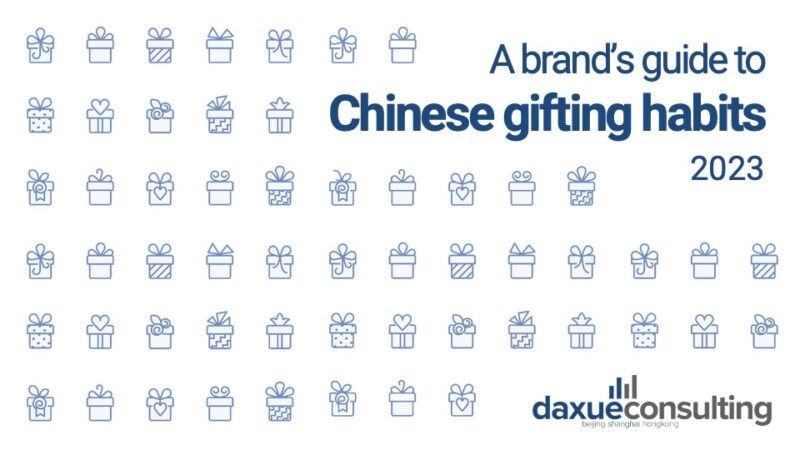
Who celebrates Christmas in China, and how is it celebrated?
Christmas in China is mainly celebrated by Gen Z and Millennials, especially those who live in tier-1 and new tier-1 cities. According to Baidu Index, among individuals searching for “圣诞节” (Christmas in Chinese) on Baidu in October this year, 48.4% are between 20 and 29 years old. This is followed by 25.5%, who are below 19 years old. Individuals aged 30 to 39 accounted for 16.1% of the search volume.
Chinese Gen Z is one of the main consumer groups celebrating Christmas. They are not only more open to Western celebrations but also to take this time to take a break from work and to create memories with their romantic partners. Christmas in China is like one of China’s numerous Valentine’s Days. Rather than spending time with their family, people spend time with their friends or romantic partners. This is partly because shortly after Christmas, there’s the Chinese New Year, which is a larger and longer holiday spent with family.
Moreover, we conducted social listening to understand online conversations on Christmas from November 1st to December 1st this year. Among the posts on Christmas, “宝宝” (baby in Chinese) was a top keyword, with 24,421 posts mentioning it. Many of these posts showed parents giving their children gifts, such as toys, and creating personalized Christmas trees with plush toys, snacks, fruits, among others.
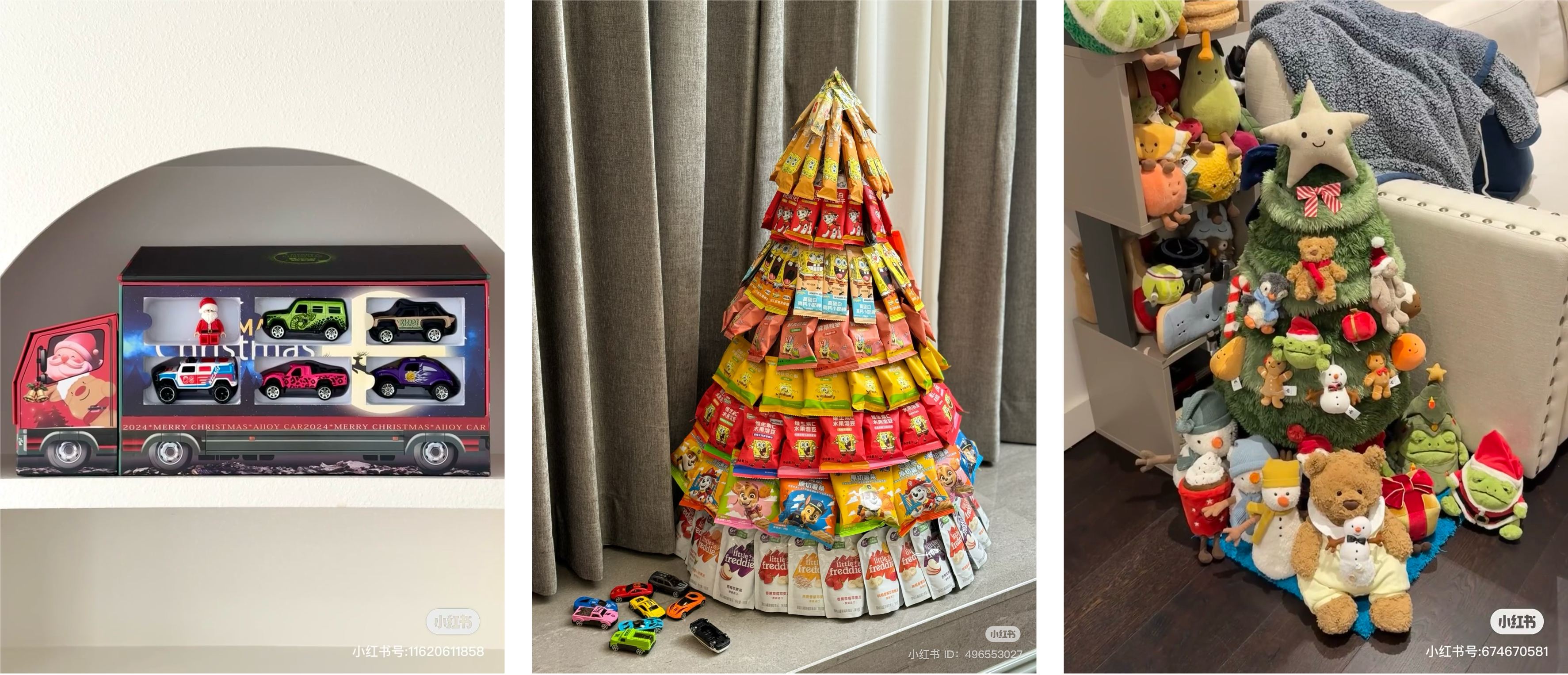
Fewer trending Christmas topics: Are people celebrating Christmas less?
Between November 1st to December 1st, 2024, there were 963,608 posts mentioning “Christmas” on Chinese social media platforms, a decline from 1,296,921 posts during the same period in 2023. Compared to the same period last year, especially on Douyin and Weibo, the number of Christmas-related topics on the hot search lists shrunk to nearly one-third of the last year’s figure.
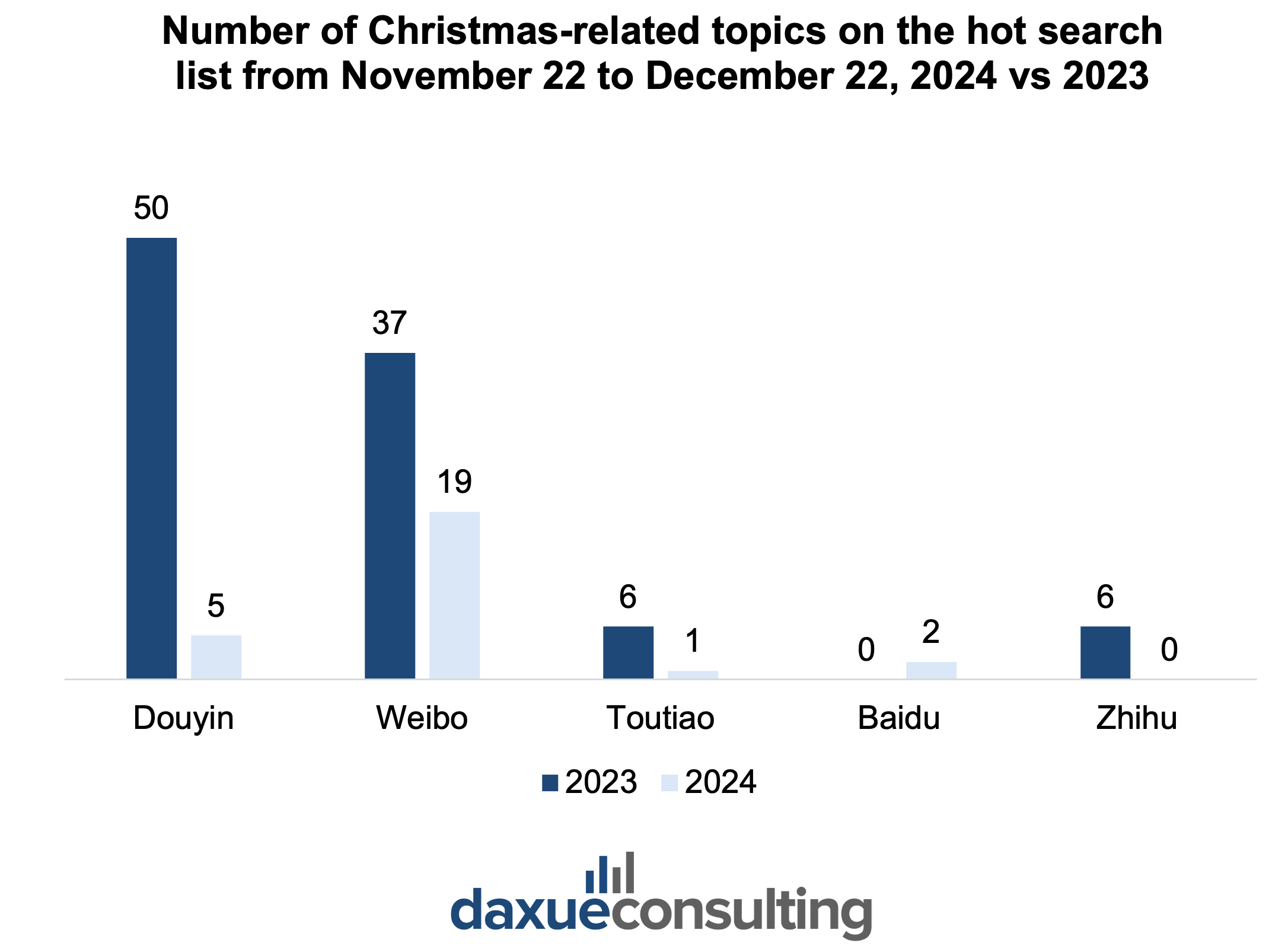
When we further analyzed trending topics, we found that compared to the past year, what remains unchanged is that people still maintain the tradition of exchanging gifts and are willing to associate Christmas with entertainment and leisure. They like to take photos under the Christmas trees in cities, such as Dalian, Qingdao, Shanghai, including anime conventions and Disneyland in Shanghai. This year, however, the locations are more scattered, covering major shopping malls, squares, and parks in various cities.
Moreover, while consumers, especially women, were more focused on Christmas-themed nail art, makeup, and hairstyles last year, they are more interested in the entertainment industry, with high interest in celebrity concerts and autograph sessions this year.

Despite fewer online discussions, offline activities thrive
However, despite people discussing less about Christmas online, it doesn’t necessarily mean that Christmas’ popularity is waning. During the month of December, every night for a month feels like Christmas. During the nighttime, cities such as Chongqing, Shanghai, and Chengdu are also bustling with crowds. For example, in Chengdu, public areas are adorned with massive Christmas trees and artificial snow, creating a magical and joyful atmosphere. Also, restaurants and upscale hotels actively participate in the festivities by crafting special Christmas meals, from themed afternoon teas, to elaborate buffets.
China’s nighttime economy on Christmas has progressed beyond mere food consumption. It now encompasses a diverse array of cultural and entertainment activities, including concerts, art exhibitions, and night tours. For example, on Damai, China’s most famous entertainment ticketing platform, there were 235 Christmas-themed performances across the country. Chinese lantern festivals can also be seen; for example, the 39th Qinhuai Lantern Festival in Nanjing is open during the Christmas period.
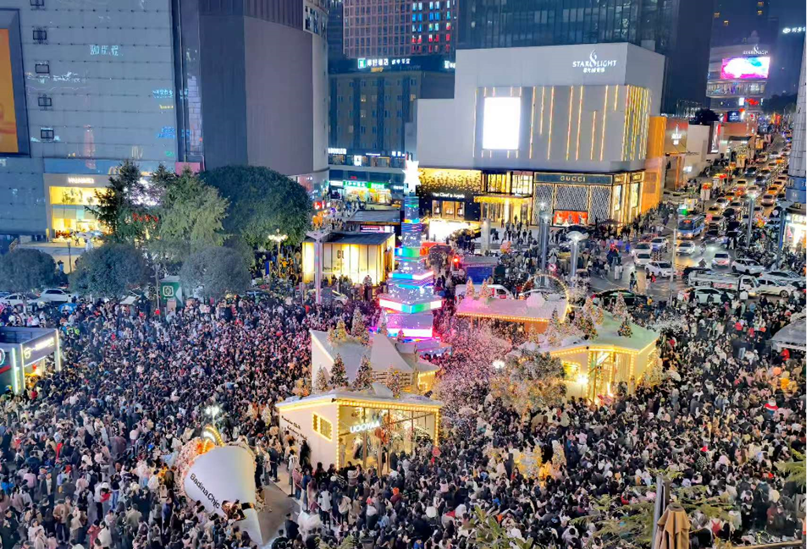
Christmas marketing: product design and campaigns on social media
Desserts, especially chocolate, were the most mentioned Christmas-related posts on social media from November 1st to December 1st this year. They were given as gifts or to celebrate the occasion. This was followed closely by clothing items, such as scarves, toys, and cosmetics.
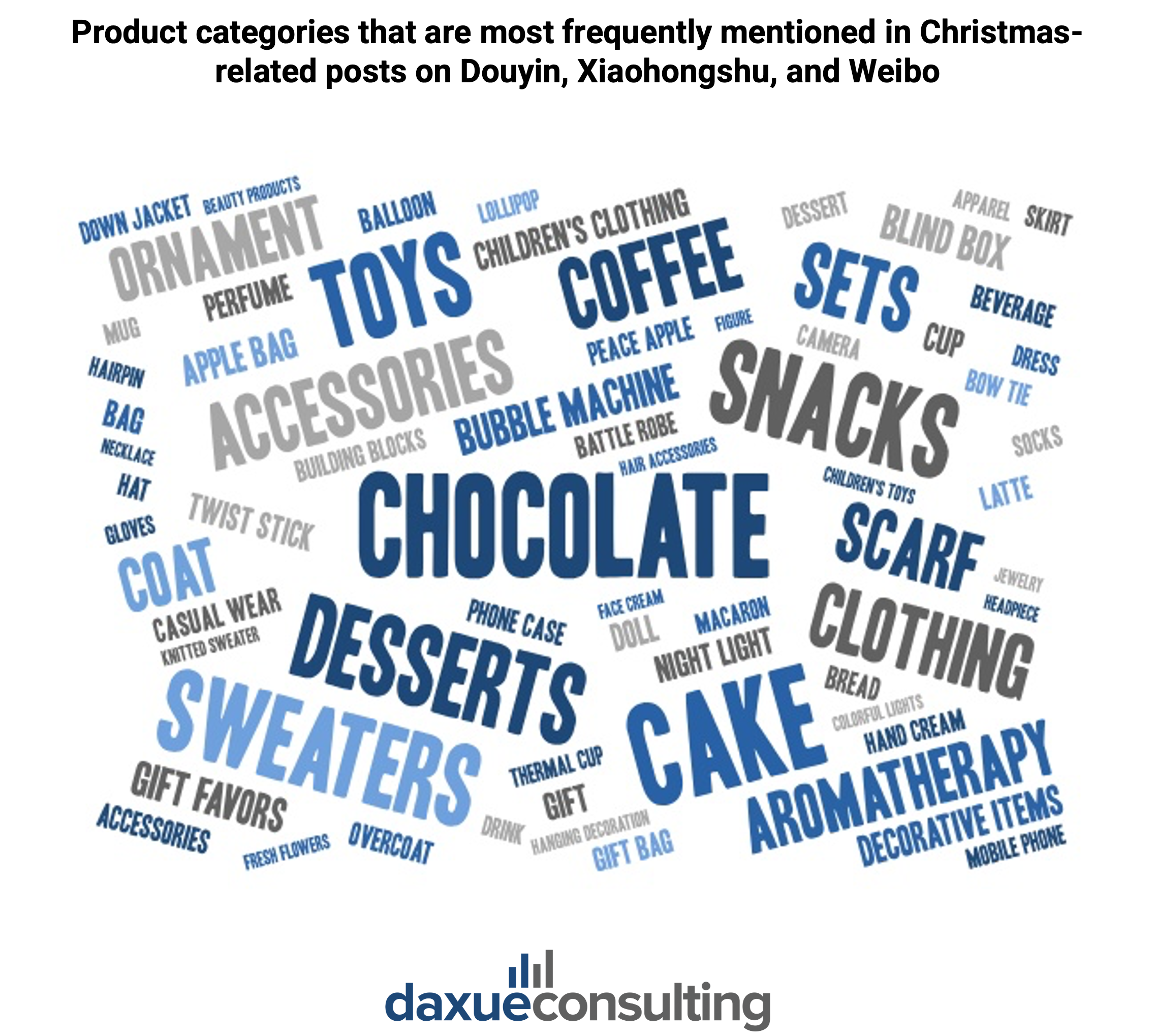
Brands embraced the festive season with creative strategies, from unique product designs to co-branding in China. They customized products in the shape of Christmas trees and change the packaging. For example, Louis Vuitton launched a limited-edition chocolate series, with products like four-petal flowers and diamonds layered to create a Christmas tree. Moreover, beauty and luxury brands like SNIDEL BEAUTY and Yves Saint Laurent launched Christmas Advent Calendar Gift Boxes.
Fast food chains also did co-branding in China to offer special gifts for their customers. For instance, KFC collaborated with Loopy to give away Christmas toys to customers who purchased meal sets. This popular Loopy IP captured the hearts of young people with its charming design. On Douyin, the topic “Loopy” garnered over 1.93 billion plays. The co-branded dolls are adorned in festive Christmas attire, exclusively available for purchase at KFC. Once the Christmas campaign concludes, these dolls will no longer be available at KFC. This creates a sense of scarcity that entices customers to seize the opportunity to collect these limited-edition dolls.
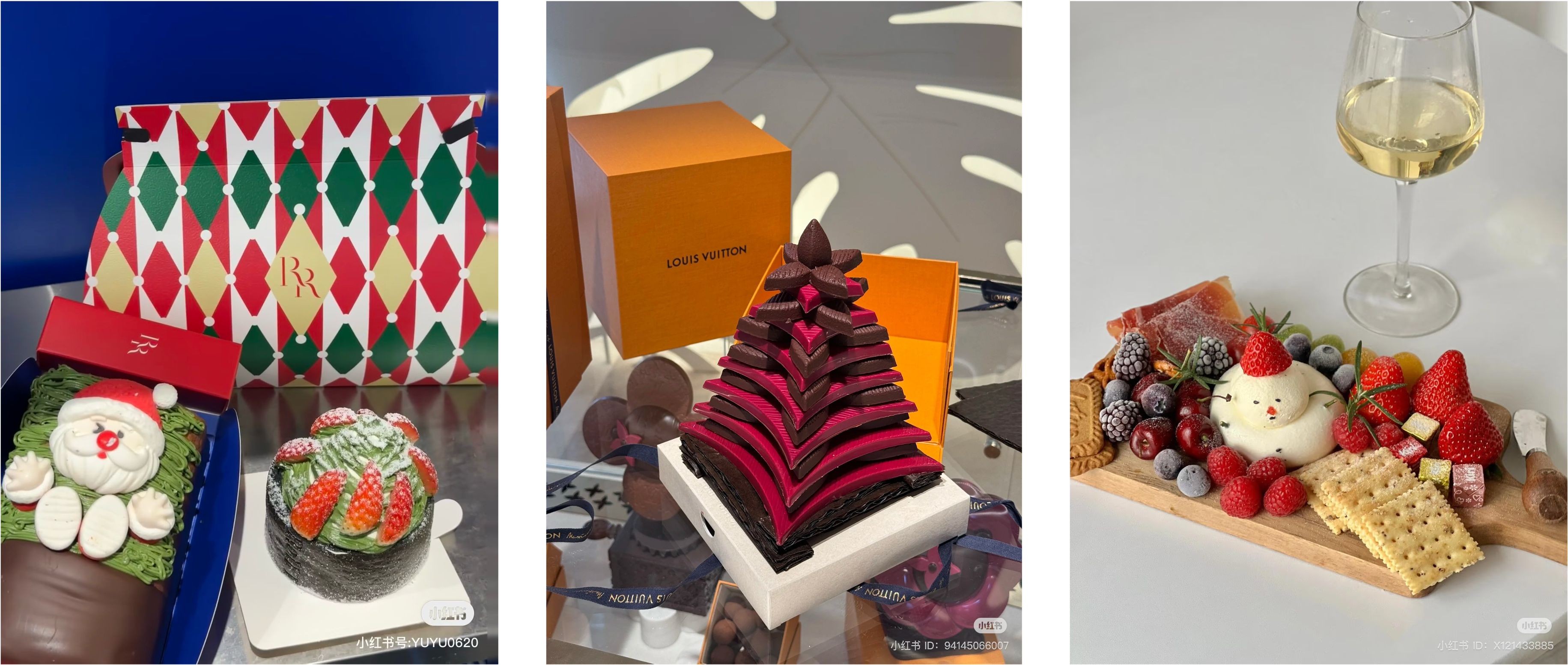
Raising awareness and engaging with consumers through KOLs
KOL marketing in China remains an important way to raise awareness and engage with Gen Z consumers. Brands invite influencers to share their shopping experiences, provide recommendations, and ultimately endorse their products. Notably, 77.55% of Gen Z learn about a brand from recommendations by KOLs, while 52.30% from word of mouth.
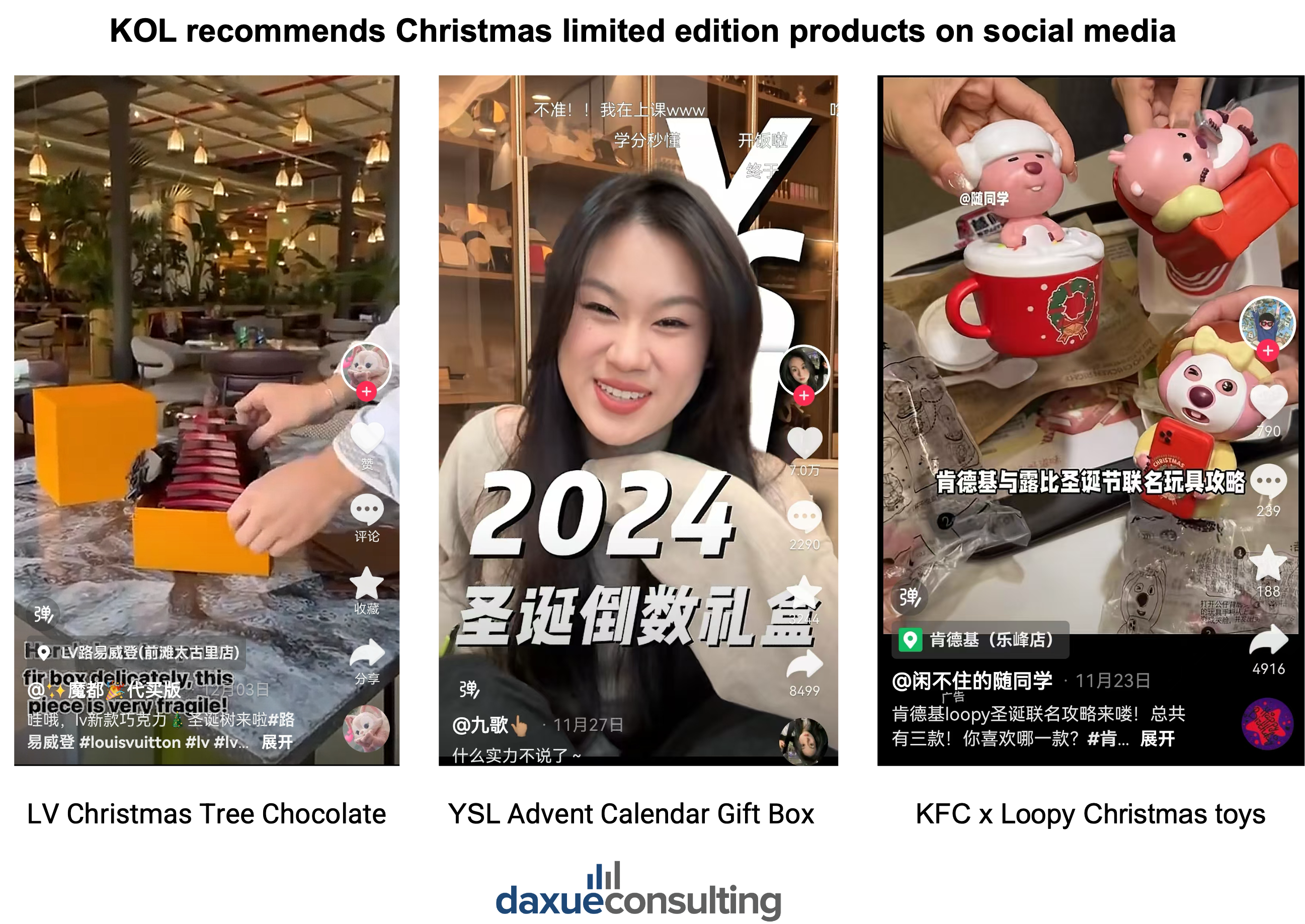
Christmas and New Year’s (双旦) sales promotions
Shuangdan (双旦) in China refers to the combined celebration and marketing promotions of Christmas and New Year. The name “Shuangdan” literally means “Double Dan” because the two holidays are close in date, and “dan” is a homophone for one character in both “Christmas” and “New Year” in Chinese. The promotion period typically runs from December 16 to December 25, after Double Twelve and until Christmas. Taobao, Tmall, and other e-commerce platforms provide instant discounts on single products and tiered discounts for spending a specific amount in a single store or across multiple stores.
Although not as big as the 2024 Double 11, many people take the time to buy gifts for their romantic partners and friends. They also buy gifts for their family, but Chinese New Year remains the main gift-giving occasion.
These gifts can serve as smaller gifts given before they prepare larger gifts on Chinese New Year. On Tmall, Florasis’s gift boxes were popular as gifts appropriate to give to relatives. The products are a few hundred RMB, and consumers can get them at a discount. In addition to beauty, other categories topping Taobao’s super items list in 2024 include down jackets, cookware, bags, and underwear.

Exploring the endless possibilities of Christmas in China
- While not a public holiday or religious event, Christmas is celebrated by young people, especially those in tier-1 and new tier-1 cities.
- Unlike the West, Christmas is more about spending time with friends and romantic partners in China. It is like one of China’s numerous Valentine’s Days.
- Online discussions about Christmas and the number of discussions on trending Christmas-related topics have declined compared to last year. However, many still show interest in its offline activities, such as city decorations, themed entertainment events, and nighttime economy activities.
- Among popular Christmas-related products shared on social media are desserts, such as cakes and chocolate, followed by clothing items, toys, and cosmetics.
- Shuangdan (双旦) is a period that combines Christmas and New Year in China. While the sales promotions are not as significant as those of Double 11, they still attract consumers looking for gifts.






